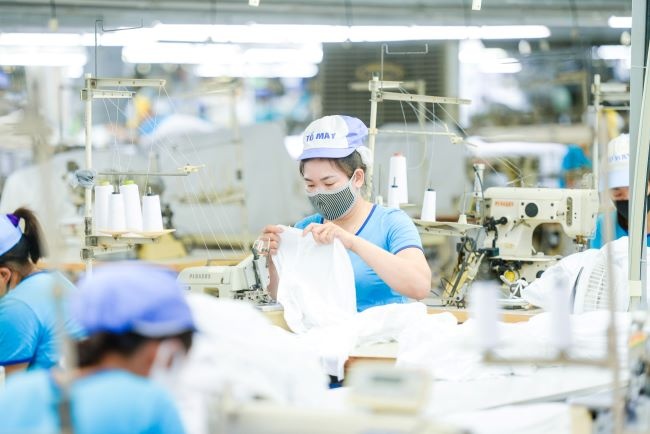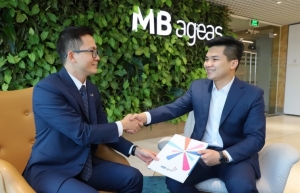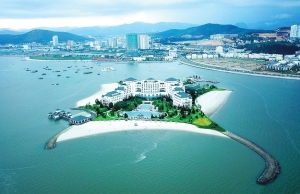Roadblocks remain in apparel production recycling
The issue was discussed at the Texfuture Fall-Winter Vietnam 2023 exhibition on September 20-22 in Ho Chi Minh City.
At the exhibition, Hua Phu Doan, standing vice president of the Vietnam Waste Recycling Association, said that many difficulties persist with implementing recycling in textiles and garments because the cost is still quite high when businesses need to both reduce impacts on the environment in production practice and lower the production cost.
Using recycled material in the sector has a price equal or even higher than that of a conventional product, so that manufacturing businesses tend to choose regular products instead of using recycled materials.
"Particularly, the community awareness about using recycled products is not high. Therefore, with improved people’s awareness and consumers willing to buy recycled products at higher price, the pressure on the sector could be abated," said Doan.
 |
Vu Duc Giang, chairman of Vietnam Textile and Apparel Association (Vitas), added that based on current requirements from importers, several kinds of textile apparel items need to use recycled materials in their production, in which some items mandate using from 30-60 per cent of recycled materials in each item production.
At the event, Phoebe Truong, CEO of Lien Phuong Textile and Garment Corporation (LPTEX) said that as using entirely recycled polyester in production would affect the product purity compared to conventional items, manufacturers therefore need some blending in the use of production materials.
Along with this, based on customer requirements, the rate of blending averages 30-70 per cent, sometime reaching 100 per cent with products using recycled polyester, and 30-40 per cent with products using recycled wool.
For instance, LPTEX’s several partners in the Japanese market demand the use of 30 per cent of recycled polyester in each item production, and those in the EU mandate using about 30 per cent of recycled wool in each item production.
| Increasing sustainability footprints through creating recycled items helps Vietnamese firms to boost order intake. |
Currently, for its products entirely made of wool serving the domestic market, the company uses 10-20 per cent of recycled wool in the production.
Tran Thi Tra My, representing Hanoi-based VietKai Co., Ltd. which is specialised in producing Microfiber high-quality industrial leather, has concerns over what to do to make recycled materials become more competitive.
My said that their company mostly imports environmentally friendly materials from China, as Vietnam has yet to have production facilities capable of turning out quality recycled materials at competitive price.
“Our country already has environmentally friendly materials for leather production, such as lotus leaves or corn powder, yet due to the lack of advanced technics, the production cost is often higher compared to imported products from China,” said My.
This is deemed a major challenge in the production of recycled items. For the part of LPTEX, the company imports fibre made from recycled materials from China and imports from Australia items purely made from wool.
Their finished products therefore have price higher from 5-15 per cent, depending on market supply sources and the value of recycled materials in the production.
“If not leveraging the tax advantages through new-generation free trade agreements Vietnam has with the international community, Vietnamese-made recycled products couldn’t compete with those from China,” said Phoebe Truong.
According to Giang, increasing sustainability footprints through creating recycled items helps Vietnamese businesses to boost order intake.
Vitas and its management authority, the Ministry of Industry and Trade, have been turning to the government for guidance to materialise the textile apparel development strategy for the period 2021-2035, with vision towards 2045. Based on that, localities are tasked with embarking on land planning for the construction of industrial zones on par with environmental and waste standards.
 | Clearing up issues related to recycling costs Many foreign-invested producers are concerned about the high recycling costs, which could create a significant financial burden for their businesses and potentially lead to increased product prices for consumers. Being a representative for the policy marker parties, I would like to clarify some basis for building the formula to help the business community have clear knowledge on this issue. |
 | Insurance firms tackle remediation process Recent financial inspections have exposed systemic irregularities in Vietnam’s life insurance sector, triggering swift remedial actions by firms including MB Ageas Life, Prudential Vietnam, BIDV MetLife, and Sun Life Vietnam. |
 | Localities take on irksome admin process A number of localities are slashing procedures for project approvals in order to lure in foreign investment at a faster pace. |
What the stars mean:
★ Poor ★ ★ Promising ★★★ Good ★★★★ Very good ★★★★★ Exceptional
Related Contents
Latest News
More News
- Trung Nam-Sideros River consortium wins bid for LNG venture (January 30, 2026 | 11:16)
- Vietnam moves towards market-based fuel management with E10 rollout (January 30, 2026 | 11:10)
- Envision Energy, REE Group partner on 128MW wind projects (January 30, 2026 | 10:58)
- Vingroup consults on carbon credits for electric vehicle charging network (January 28, 2026 | 11:04)
- Bac Ai Pumped Storage Hydropower Plant to enter peak construction phase (January 27, 2026 | 08:00)
- ASEAN could scale up sustainable aviation fuel by 2050 (January 24, 2026 | 10:19)
- 64,000 hectares of sea allocated for offshore wind surveys (January 22, 2026 | 20:23)
- EVN secures financing for Quang Trach II LNG power plant (January 17, 2026 | 15:55)
- PC1 teams up with DENZAI on regional wind projects (January 16, 2026 | 21:18)
- Innovation and ESG practices drive green transition in the digital era (January 16, 2026 | 16:51)

 Tag:
Tag:


























 Mobile Version
Mobile Version